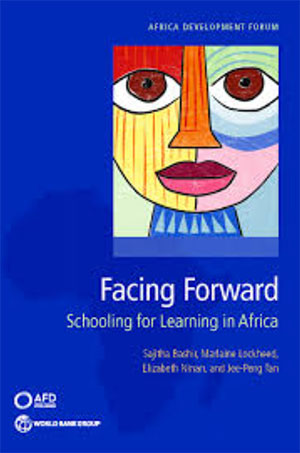 Findings and insights from “Facing Forward: Schooling for Learning in Africa” by Sajitha Bashir, Marlaine Lockheed, Elizabeth Ninan and Jee-Peng Tan (World Bank 2018)
Findings and insights from “Facing Forward: Schooling for Learning in Africa” by Sajitha Bashir, Marlaine Lockheed, Elizabeth Ninan and Jee-Peng Tan (World Bank 2018)
SPEAKERS Sajitha Bashir, Manager for the East Africa region in the World Bank’s Education Global Practice
Marlaine Lockheed, Visiting Lecturer at Princeton’s Woodrow Wilson School of Public and International Affairs and former Manager for the Middle East region in the World Bank’s Education Sector (SIDEC ’72)
DESCRIPTION OF TALK
Across Africa, some 50 million children are out of school. For those in school, most are not learning the basic skills needed to thrive in the future. The new World Bank book, 'Facing Forward, Schooling for Learning in Africa', shows that the continent faces a "severe learning crisis" that jeopardizes economic growth and the well-being of its citizens. This book lays out a range of policy and implementation actions that are needed for countries in sub-Saharan Africa to improve learning while expanding access and completion of basic education for all.
The authors conduct extensive new analyses of multiple datasets from the region, integrating findings about children's learning, access to school and progress through basic education. Separate chapters review the learning crisis, teacher policies, budgeting and institutional capacity. Join our ICE/IEPA Brown Bag Lunch Series and meet the authors to discuss policy recommendations included in this publication.
ABOUT THE SPEAKERS and AUTHORS


Elizabeth Ninan (Dulvy) is a senior education specialist in the World Bank’s Education Global Practice and has 20 years of experience working on issues related to human development in several countries, particularly in Africa. She has led World Bank projects, studies, and policy dialogues in basic education, secondary education, and skills development in India, Rwanda, South Africa, Sri Lanka, Sudan, and Uganda. Before joining the World Bank, she was codirector of the Joint Economics AIDS and Poverty Programme in South Africa, which sought to build the capacity of historically disadvantaged individuals and higher education institutions to deliver high-quality research for policy makers in health and social development. She holds a master’s degree in development planning from Wits University in Johannesburg and dual master’s degrees in public policy and quantitative methods from Columbia University.
Jee-Peng Tan is a consultant to the World Bank’s Educational Global Practice, following her retirement from some three decades in senior positions at the Bank, including as education adviser, working with colleagues and counterparts in government and international organizations on human capital challenges in emerging economies. She led the Policy and Sector Analysis Support Team in the Africa Region’s Human Development Department, whose work includes debt relief for education and health under the Highly Indebted Poor Countries Initiative and implementation of the then-nascent Education for All Fast Track Initiative. She managed the production of analytical products, among them regional flagship reports and education country status reports, to shape policy dialogue and lending operations. She facilitated high-level exchange among African policy makers and their counterparts in China, India, Singapore, and Vietnam. She is an author of some 60 published works, including books, among them Workforce Development in Emerging Economies and Tools for Education Policy Analysis. She holds a bachelor’s degree from the London School of Economics and Political Science and a doctorate from Princeton University.

